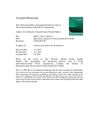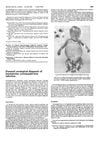 68 citations,
March 2002 in “Journal of pharmaceutical sciences”
68 citations,
March 2002 in “Journal of pharmaceutical sciences” Nonionic liposomes are the best for delivering genes to skin cells.
 56 citations,
October 1983 in “Archives of Dermatology”
56 citations,
October 1983 in “Archives of Dermatology” Some women with acne have higher levels of free testosterone, which might suggest using hormonal treatments for acne.
 54 citations,
November 2015 in “Methods in enzymology on CD-ROM/Methods in enzymology”
54 citations,
November 2015 in “Methods in enzymology on CD-ROM/Methods in enzymology” Keratins are important for skin cell health and their problems can cause diseases.
 53 citations,
October 1978 in “Archives of dermatology”
53 citations,
October 1978 in “Archives of dermatology” Zinc supplements can resolve skin issues caused by zinc deficiency.
 49 citations,
January 1980 in “Journal of Cardiovascular Pharmacology”
49 citations,
January 1980 in “Journal of Cardiovascular Pharmacology” Minoxidil doesn't increase pericardial disorder risk, but may cause fluid accumulation.
 48 citations,
February 2016 in “Scientific Reports”
48 citations,
February 2016 in “Scientific Reports” Researchers created rat liver stem cells that could help repair liver failure in rats and may be useful for studying human liver diseases.
 42 citations,
February 1985 in “Journal of the American Academy of Dermatology”
42 citations,
February 1985 in “Journal of the American Academy of Dermatology” Excessive hair growth can be assessed by history, exam, and blood tests, and treated with medication like dexamethasone, birth control pills, and spironolactone.
 40 citations,
July 2007 in “Dermatologic Therapy”
40 citations,
July 2007 in “Dermatologic Therapy” Systemic glucocorticosteroids are a primary treatment for various skin conditions but require careful management due to potential side effects and relapses.
 40 citations,
March 1982 in “British Journal of Dermatology”
40 citations,
March 1982 in “British Journal of Dermatology” Young women with diffuse hair loss may have low SHBG levels, which could lead to more active testosterone and contribute to their hair loss.
 39 citations,
August 2017 in “Colloids and Surfaces B: Biointerfaces”
39 citations,
August 2017 in “Colloids and Surfaces B: Biointerfaces” 50-nm nanoparticles are better at penetrating skin and targeting hair follicles for drug delivery than 100-nm ones.
 39 citations,
June 1982 in “The BMJ”
39 citations,
June 1982 in “The BMJ” Blood tests confirmed a baby in the womb had a CMV infection.
 34 citations,
July 2020 in “Frontiers in immunology”
34 citations,
July 2020 in “Frontiers in immunology” Androgens may influence T cells, contributing to higher autoimmune liver disease risk in women.
 33 citations,
October 2004 in “Archives of Dermatological Research”
33 citations,
October 2004 in “Archives of Dermatological Research” Large prostate links to more hair loss, but age of onset doesn't affect it.
 30 citations,
January 2008 in “The Aging Male”
30 citations,
January 2008 in “The Aging Male” The study found no link between baldness patterns and androgen levels in men with benign prostate enlargement or prostate cancer.
 28 citations,
May 2013 in “The Journal of Steroid Biochemistry and Molecular Biology”
28 citations,
May 2013 in “The Journal of Steroid Biochemistry and Molecular Biology” Testosterone therapy can improve sexual desire and function in postmenopausal women but should be used cautiously and not based solely on testosterone levels.
 28 citations,
January 2003 in “Urologic oncology”
28 citations,
January 2003 in “Urologic oncology” Suppressing certain hormones might help prevent prostate cancer.
 28 citations,
October 1998 in “Baillière's clinical endocrinology and metabolism”
28 citations,
October 1998 in “Baillière's clinical endocrinology and metabolism” Testosterone replacement may help post-menopausal women with androgen insufficiency, but more research is needed on its benefits and risks.
 23 citations,
January 2016 in “Theranostics”
23 citations,
January 2016 in “Theranostics” Minoxidil-coated microbubbles with sonication effectively enhance hair growth.
 23 citations,
August 2005 in “Expert opinion on pharmacotherapy”
23 citations,
August 2005 in “Expert opinion on pharmacotherapy” New treatments for low male hormones improved sexual function and mood but had unclear risks, especially for older men.
 23 citations,
April 1993 in “Gastroenterology”
23 citations,
April 1993 in “Gastroenterology” A mother and son both had ulcerative colitis and alopecia, suggesting a genetic link in autoimmune disorders and successful treatment with cyclosporine.
 21 citations,
October 1980 in “Gastroenterology”
21 citations,
October 1980 in “Gastroenterology” The report described a unique case of Cronkhite-Canada syndrome with unusual polyps and an association with multiple myeloma.
 20 citations,
October 2008 in “Archives of dermatological research”
20 citations,
October 2008 in “Archives of dermatological research” Angiogenin helps hair grow by stimulating cell growth and blood vessel formation.
 19 citations,
March 1990 in “Journal of Cardiovascular Pharmacology”
19 citations,
March 1990 in “Journal of Cardiovascular Pharmacology” Minoxidil affects rat fluid dynamics, altering pressure and circulation, improving blood flow and hair growth.
 18 citations,
February 2016 in “The Journal of Clinical Endocrinology and Metabolism”
18 citations,
February 2016 in “The Journal of Clinical Endocrinology and Metabolism” Advancements in male reproductive medicine are ongoing, but more research and improved treatments are needed in several areas.
 15 citations,
September 2013 in “Pharmaceutical Biology”
15 citations,
September 2013 in “Pharmaceutical Biology” Jujube fruit extract may reduce kidney damage from ibuprofen in rats.
 15 citations,
May 2003 in “American Journal of Kidney Diseases”
15 citations,
May 2003 in “American Journal of Kidney Diseases” A hemodialysis patient's hair loss was caused by the drug tinzaparin but stopped after switching to a different drug.
 14 citations,
August 2009 in “Cancer epidemiology”
14 citations,
August 2009 in “Cancer epidemiology” AHCC reduces hair loss and liver injury caused by chemotherapy in rodents.
 14 citations,
January 1990 in “Fertility and Sterility”
14 citations,
January 1990 in “Fertility and Sterility” Some patients with high prolactin levels don't show symptoms because they have a form of the hormone that's less active.
 13 citations,
June 1989 in “Pediatric clinics of North America/The Pediatric clinics of North America”
13 citations,
June 1989 in “Pediatric clinics of North America/The Pediatric clinics of North America” The conclusion is that young women with excessive hair growth should be quickly tested for hormonal issues and treated to improve their social well-being.
 12 citations,
March 2017 in “Journal of obstetrics and gynaecology Canada”
12 citations,
March 2017 in “Journal of obstetrics and gynaecology Canada” Testosterone therapy can modestly improve sexual function in menopausal women but should be used cautiously and is not recommended for routine measurement in sexual dysfunction or hirsutism.






























